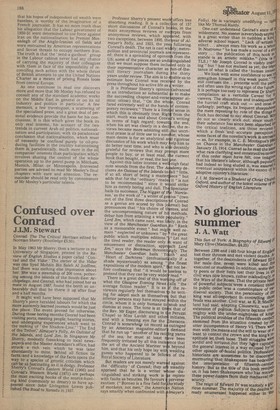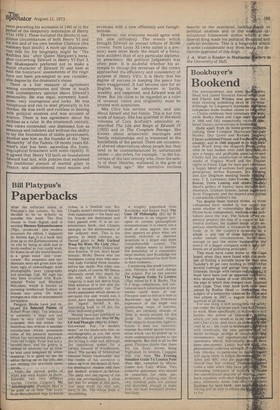No glorious summer
J. A. Watt
This Sun of York: A Biography of Edwa0 117 Mary Clive (Macmillan, £4.25)
s
Between 1399 and 1485 four kings of Ens.i04 lost their thrones and met violent deaths. together, of the descendents of Edward the male line, seven were killed. and fi,le: executed or murdered. In addition, sotnett ty peers or their heirs lost their lives in EJL" civil wars now known, rather misleadingiY, the Wars of the Roses. That the private feovt of powerful subjects were a constant thr0 to public order was a commonplace of diaeval society. That the personality of ti; king was all-important in controlling thQ feuds was another. Civil war, as K. B..fslaCfP" land had said, adapting Clausewitz, was the. extension of politics, Subjects became over mighty with the under-mightiness of king! The political troubles of the fifteenth' cenWi.", stemmed from the situation created by t!'w utter incompetence of Henry VI, There we men with the means and the will to wear or' least to control the crown and the king's eptitude let.them loose. Their struggles *veered sordid and tortuous bin theyNye capta"
r
the general interest in a way enjoyed VI other episode of' feudal po11tic. Professi0111_1,4 historians are sometimes to be .discove1l. murmuring that, Shakespeare has bedevinv" the interpretation of fifteenth-centadsj I history. 'But as the title of this book rerniet us, it has been Shakespeare who has rescio: these power-lusters from their Mediaeval or scurity. The reign of Edward IV was scarcely a glo,: rious summer. The majority of the deaths gin ready enumerated happened either In til` Years preceding his accession in 1461 or in the Period of the temporary restoration of Henry Vim 1470.1. These included the deaths in sus. Picious circumstances of both Henry VI and hit son and of his own brother Clarence (the M. almsey butt death). A more apt Shakespearian title for his biography might be 'The Ruthless Sea after Queen Margaret's metaPhor concerning Edward in Henry VI Part 3. But Shakespeare preferred not to make a Major character of Edward IV and here at least the historians' assessments of the reign have not been pre-empted to any consider:able degree by the dramatist's vision
There is a fair measure of agreement among contemporaries and those in touch With contemporary opinion about Edward's Personality. He was regal, extremely handsome, very courageous and lucky. He was voluptuous and ran to seed physically in his thirties. He was swift and ruthless in dealing With political enemies and was accused of avarice. There is less agreement about his abilities as a ruler. In the nineteenth century, two views contended: one dismissed him as sensuous and indolent and without the ability to lay the foundations of stable government; another saw him as the founder of the 'New Monarchy ' of the Tudors. Of recent years EdWard's star has been ascending the historiographical firmament with some rapidity. It is agreed that Henry VII built on foundations Edward had laid, with policies that eschewed the traditional pursuit of martial glory in France, and administered royal estates and revenues with a new efficiency and farsightedness.
However, not everyone would agree with the new orthodoxy. The events which brought Edward an annual tribute of 50,000 crowns from Louis XI (who called it a pension) were more likely the result of a fortunate accident than of any particular diplomatic prescience. His political judgement was often poor. It is doubtful whether his attempts to recoup the revenues of the crown approached the efficiency and consistency of purpose of Henry VII's. It is likely that his degree of success in keeping the peace has been exaggerated. It had become rare for an English king to be unbeaten in battle, wealthy and respected, and Edward was all three. But his claim to be regarded as a ruler of unusual vision and originality must be treated with scepticism.
Mrs Clive has written novels, and also about herself and her family. This is her first work of history. She has quarried in the stout volumes of Cora Scofield's admirably researched The Life and Reign of Edward IV (1923) and in The Complete Peerage. She knows about aristocratic marriages and family relationships and is interested in the battlefields of the period. There are occasional shrewd observations about people but they tend to be counterbalanced by unfortunate asides — she refers, for example, "to the historians of the last century who, from the safety of their libraries, wallowed in the gore of battles long ago." Her narrative inclines heavily to the anecdotal, lackingiaepth in political analysis and in the esaptial -institutional framework within whici) a mediaeval king made his political, finalat ial and judicial decisions. This is a biograpla5F Which is some considerable way from being the definitive appraisal of this reign.
J. A. Watt is Reader in Media tarp at
the University of Hull.



































 Previous page
Previous page